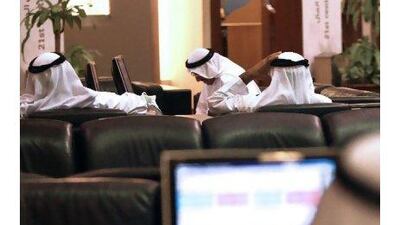Central banks will take centre stage this week with new stimulus measures and currency volatility poised to have a big impact on UAE stocks.
Five central banks will hold meetings to discuss policy measures, including the US Federal Reserve, which is expected to announce fresh stimulus measures to bolster the flagging economy.
That stimulus could result in pronounced gains for stocks in Dubai and Abu Dhabi, which traders said were well positioned to continue their three-month surge as western investors look for growth opportunities overseas.
"The market in Dubai hit a new high and the close of last week was fantastic," said Saad al Chalabi, an institutional trader at AlRamz Securities.
"It's a new high for this rally. It's looking very positive for the coming weeks that they were able to break that high."
Mr al Chalabi said UAE stocks could surge over the next few days, adding the Dubai Financial Market (DFM) General Index may reach as high as 1,800.
"We paused because of these earnings and now that that's out of the way, there's nothing to stop them," he said.
But markets around the world will be awaiting the outcome of the two-day Fed meeting to begin on Tuesday. Although analysts differ in their predictions of how much, if any, stimulus is expected, Goldman Sachs said in a note last week the Fed's new quantitative easing measures could amount to as much as US$2 trillion (Dh7.34tn).
UAE stocks may gain from that but the full effects of quantitative easing are harder to predict, as the stimulus may erode the value of the dollar and dollar-pegged currencies, such as the dirham.
But currency volatility is almost a certainty with the Fed, the Bank of England, the Bank of Japan, the Reserve Bank of Australia and the European Central Bank all holding meetings. The effect on currencies will be "totally unpredictable", according to Neil Mellor, the currency strategist at BNY Mellon.
"The … week is going to be extraordinary, really," Mr Mellor said. "You can look at every central bank meeting as potentially pivotal for the price action for the remainder of the year."
He said emerging markets in Asia and the Middle East might benefit more from stimulus measures than the developed markets they were designed to bolster.
"You can pump as much stimulus as you like into your economy," said Mr Mellor. "But if the banks aren't functioning as they should, it tends to go abroad."
Mr al Chalabi said stocks of companies in the UAE such as Emaar Properties, Arabtec Construction and Drake and Scull International would be the beneficiaries of a fresh round of quantitative easing.
And mid-term elections in the US take place on Tuesday and are widely expected to result in the US President Barack Obama's Democrats losing control of the House of Representatives, according to estimates by the polling website FiveThirtyEight.
A Republican victory, bringing with it renewed calls to cut the US deficit, may cause the dollar to strengthen, Mr Mellor said.
The DFM ended last week up 1.5 per cent; the Abu Dhabi Securities Exchange was down 0.1; and the Abu Dhabi Islamic Bank Index lost 0.04 per cent last week.

